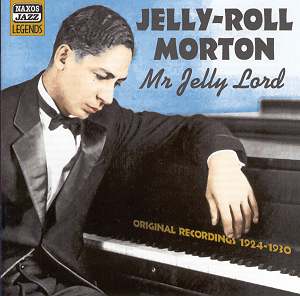Black Bottom Stomp [3.10]
Smoke House Blues [3.23]
The Chant [3.07]
Tom Cat Blues (piano solo) [3.00]
King Porter Stomp (piano solo) [2.48]
Sidewalk Blues [3.26]
Dead Man Blues [3.20]
Steamboat Stomp [3.05]
Grandpa’s Spells [2.51]
Original Jelly Roll Blues [3.03]
Doctor Jazz - Stomp [3.03]
The Pearls (piano solo) [2.46]
The Pearls [3.24]
Mr Jelly Lord (Jelly-Roll Morton and his Trio)
[2.50]
Georgia Swing [2.28]
Deep Creek [3.29]
Seattle Hunch (piano solo) [3.06]
Freakish (piano solo) [2.51]
Ponchatrain [2.53]
Burnin’ the Iceberg [3.03]
All numbers written by Ferdinand ‘Jelly-Roll’
Morton except tracks 2 and 9 (Charles Luke),
and 11 (King Oliver-Walter Melrose)
rec. Richmond, Indiana 9
June 1924 (track 4), Chicago 20 April 1926
(tracks 5, 12), 15, 21 September 1926 (tracks
1-3, 6-8), 16 December 1926 (tracks 9-11),
10 June 1927 (tracks 13-14), New York 11 June
1928 (track 15), 6 December 1928 (track 16),
Camden, New Jersey 8 July 1929 (tracks 17-18),
9 July 1929 (track 20), New York 20 March
1930 (track 19)
Ferdinand Joseph La Menthe,
aka Jelly-Roll Morton, was a jazz giant and
a performing genius. Born near New Orleans,
the spiritual if not actual birthplace of
jazz, Morton began playing piano at ten, usually
background music for customers in bordellos,
something he had in common with Brahms, who
played in Hamburg’s brothels at a similar
age. There the common thread ends.
Between 1904 and 1922 (aged
19-37) Morton dabbled in a variety of jobs
such as pool shark, vaudeville comedian, pimp,
hotel manager, boxing promoter, tailor and
gambling house manager, with piano playing
a constant throughout. He only began recording
in 1923 at a time when he had already defined
a role for himself in the profession midway
between ragtime and early jazz. By the time
he moved from LA to Chicago in 1923, he was
the complete professional musician and recorded
piano solos for Paramount, though regrettably
they were noted for crude results regarding
such basics as minimising surface noise. Fortunately
he switched to Victor and produced his best
work between 1926 and 1930. After his contract
ended, Morton’s life was not happy. Struggling
with poor health - a weak heart - and indecisive
moves such as running a dive in Washington,
he died in 1941 just as his music was making
a comeback.
These twenty tracks are the
pick of those four golden Victor years 1926-1930,
and the cast list of his fellow performers
makes impressive reading, Kid Ory (trombone),
Johnny St Cyr (banjo), Omer Simeon, Barney
Bigard and the great Johnny Dodds (clarinets),
George Mitchell (cornet), Baby Dodds (drums),
and a host of others who came and went from
the Red Hot Peppers. ‘Ah Mr Jelly’- up goes
the cry from Morton himself during the evocative
Smoke House Blues, a haunting number. So too
is The Pearls, which you get the bonus chance
to hear twice, in its band version immediately
after the solo on tracks 12-13, and which
is really a thinly disguised Beale Street
Blues. Besides stunning piano playing throughout
(there are five piano solo tracks here), it
is Morton’s high level of imaginative and
unpredictable creativity which so impresses.
King Porter Stomp - better known as a big
band classic a year later when Fletcher Henderson
recorded it - contains some strange harmonies
and piano textures, the chords widely spaced
between the two hands. More vaudeville-style
speech introduces tracks 6-8 followed by two
classic blues and a spirited stomp with fabulous
playing all round. That defining December
1926 session in Chicago produced three brilliant
numbers, Grandpa’s Spells, Original Jelly
Roll Blues and Doctor Jazz - the only number
which has a vocal, Morton himself - tracks
9-12. It’s worth buying this disc for these
three tracks alone.
Transfers and digital restoration
by David Lennick and Graham Newton respectively
are excellent, and Scott Yanow’s comprehensive
notes highly informative. I grew up with a
couple of well-worn, oft-played 10 inch LPs
of Jelly, and many of these numbers have remained
fresh in my mind when I hear them all again
on this CD. Morton was a genius, and if he
had not been known to posterity by his nickname,
Doctor Jazz would have been the perfect alternative.
Christopher Fifield
